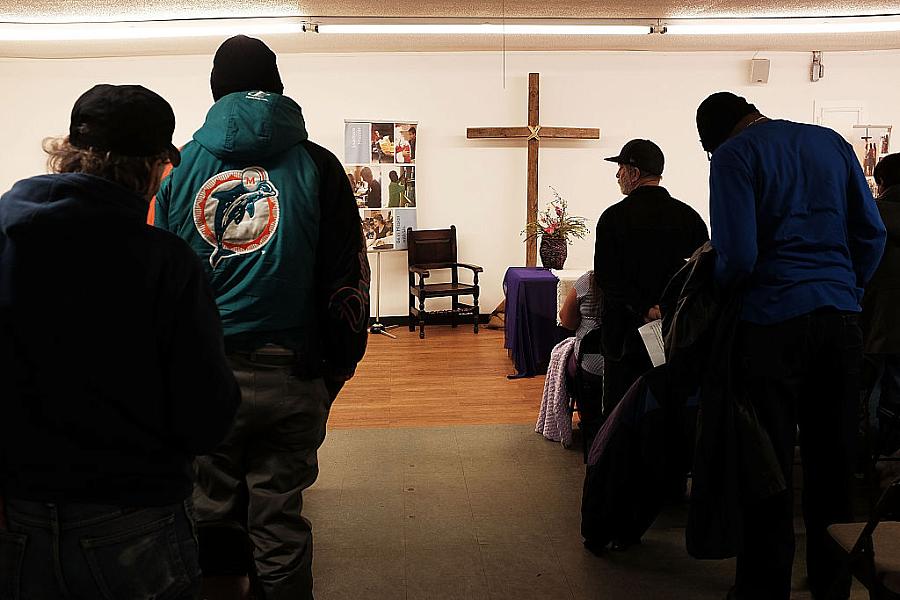The Health Divide: Anna Wolfe created a poverty beat, and uncovered a massive corruption scandal

A service takes place before a free meal for those in need at a church in Biloxi, Mississippi.
Photo by Spencer Platt/Getty Images
As journalists, we are the gatekeepers of the public’s right to know, and the people we serve don’t want to hear our excuses for being unable to tackle an issue. When we say we don’t have a reporter to cover a problem, what our readers hear is we don’t care enough about them to cover that issue.
I became a journalist to make a difference.
I wanted to tell the stories of Black and brown people not being told. Anna Wolfe became a reporter to tell the stories of those who had little to nothing.
When Wolfe saw a lack of coverage on poverty issues in Mississippi, she made a request to her future employer. If hired by Mississippi Today, she wanted to cover poverty exclusively as a beat. The online outlet granted the request, and Wolfe became the state’s first “poverty” reporter.
Wolfe won the 2023 Pulitzer Prize in Local Reporting for her investigation “The Backchannel,” which uncovered the story of the largest embezzlement of federal funds in Mississippi’s history. Her reporting showed how millions in welfare funds were misspent or stolen in the state, already the poorest in the nation.
Covering poverty is challenging because it’s deeply intertwined with other complex issues — education, housing, and health.
To highlight these issues, journalists must get people who are in a vulnerable state to share their stories about growing up. How much money do they make? What health challenges do they have? Their openness leaves them open to public criticism.
We owe it to them to give them a heads-up about the potential public scrutiny they can face.
In Mississippi, where the poverty rate is 19.4%, the state only approved 2.3% of welfare applications submitted over five years, according to Wolfe’s reporting.
We know there is a correlation between residents' health and socioeconomic status. Still, research by Dr. Anthony Iton, senior vice president at The California Endowment, showed where people live can also determine how long they live. (The California Endowment is a funder of the Center for Health Journalism.) His research found there can be as much as a 25-year difference in life expectancy between neighborhoods 1.5 miles away.
Wolfe talked about her “Backchannel” project at the Milwaukee Press Club Gridiron awards banquet on May 12. She received the Sacred Cat Award, which is given to a journalist in honor of exemplary work on a national level.
Wolfe’s project uncovered brazen corruption at the highest levels of state government.
Mississippi health officials were charged and former Gov. Phil Bryant, who oversaw the misuse and squandering of $77 million in federal funding meant to go to the state’s poorest people, is under investigation. The project also put a spotlight on longtime former Green Bay Packers quarterback Brett Favre, who sought to divert $8 million in state money to various schemes, including $5 million to build a volleyball stadium at Favre’s alma mater, the University of Southern Mississippi. His daughter played volleyball at the college.
Favre has denied any wrongdoing. However, Wolfe discovered text messages from 2019 between Bryant and Favre, where Bryant showed the NFL legend how to write a funding proposal for the stadium that the state’s Department of Human Services would accept.
Wolfe filed 100 Freedom of Information Act requests in the course of her reporting. When her requests were met with silence, she was forced to file an ethics complaint with the Mississippi Ethics Commission that she ultimately won. She created dozens of spreadsheets for her series to keep track of the sprawling investigation.
“I knew the state was still getting millions and millions of dollars from the federal government, and most of it was not going to low-income families who needed it. I wanted to know what was going on with the rest of the money,” she said.
Wolfe’s poverty beat idea evolved over the course of her career.
Before the Mississippi Today, Wolfe was a reporter at The Clarion-Ledger in Jackson, Mississippi. She covered city hall, county government, and health. She saw a pattern in her stories. Every story seemed to have an underlying theme of poverty.
Wolfe created a poverty beat because she saw a void in the coverage. The ability to tie poverty to an issue like health helps people to connect the dots. Connecting those dots allows a reporter to say with authority that funding was stolen that would’ve helped Mississippians already suffering from unmet basic needs and higher mortality rates.
That should make everyone upset. Her findings certainly made a lot of people in Mississippi angry, spurring investigations.
Wolfe fears we can all miss impactful stories because we fail to think outside the box of our traditional coverage and its beats.
We need to recognize where the gaps in our reporting lie, and that means talking and listening to the communities we serve. Get out and ask questions. Look for trends and file public records requests to get answers. And don’t give up if you’re stonewalled at first.
The communities we serve deserve that much.
Read more: Check out the award-winning “Backchannel” series and Dr. Tony Iton’s “Tell Me Yor Zip Code And I will Tell You How Long You Will Live.”
